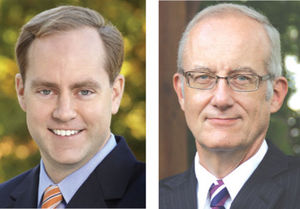By Sonia Ledwith, Jeff Martin and Liz Varner
ARLINGTON, Va.–Arlington County residents overwhelmingly see the possibility of a Columbia Pike streetcar as an issue driving them to the polls this November with others saying education matters more when choosing a candidate for the Arlington County Board.
Two candidates voiced differing opinions about the $333 million project. Alan Howze, the Democratic candidate, and John Vihstadt, the independent candidate and incumbent, ran against each other in a special election in April. They now face each other again for the chance at a full four-year term.
“We’ve had a lot of support from the community, from family,” Howze said. “This notion that it takes a village is true in campaigns as well.”
Vihstadt opposes the streetcar project, which would create a 7.4-mile route along Columbia Pike, according to the Arlington County website. It will connect with the Crystal City streetcar at Pentagon City, making stops at Metro stations along its route to add to the existing transportation network that funnels into Washington, D.C.
“The hallmark of a community is not lavish over-the-top projects,” said Vihstadt at the Arlington County Farmers’ Market on Sunday. “But rather, investments in our schools, our infrastructure and public safety, not things like a $500 million streetcar.”
Instead, Vihstadt said he supports a Bus Rapid Transit system which he believes can be implemented more quickly and economically efficiently than the streetcar.
Alan White, an Arlington resident since 1977, voiced his support for Vihstadt at the farmers’ market.
White said he is “absolutely opposed” to the streetcar because “the bus seems fine to me, the flexibility of it.”
Nicholas Rosen, another Vihstadt supporter at the farmers’ market, said he is skeptical about the streetcar.
“I’ve seen claims of advantages,” Rosen said. “But I’ve also read about…other cities which have invested in light rail which turned out not to come anywhere close to breaking even or carry nearly enough passengers as it planned for.”
Howze said the $333 million price tag is the best “bang for the buck” for the area because it will add to the existing transportation network and spur billions of dollars of growth, when interviewed at his home on Oct. 19.
Howze also referred to public transportation as the “economic engine of the community,” and said the expansion would create jobs and pump more money into the school system.
Bobby Connelly, a Howze supporter, said that he would use the streetcar because he currently commutes to work in D.C. via the Metro rail.
“A streetcar to the Columbia Pike would definitely open up options to move closer or further outside [of] Arlington,” Connelly said while tabling for the Arlington County Democratic Committee at the farmers’ market.
Currently, three out of five of the Arlington County Board members support the Columbia Pike streetcar. Vihstadt and Libby Garvey are the only opponents, but two seats will be open in the November 2015 election which could ultimately sway the vote on whether the streetcar proceeds.
On Sept. 23, the Arlington County Board approved a $26 million contract with HDR Engineering to begin engineering and designing the proposed streetcar.
Another divisive issue pressing voters this election is the increasingly overcrowded Arlington Public Schools.
On Oct. 14, Howze, along with two current Arlington School Board candidates, pledged that two boards would work collaboratively to address overcrowding.
According to the three candidates, they will look to re-open closed schools, examine potential new school sites and develop a long-term plan to create space for the expected influx of students.
If elected, Howze said that one of his main goals is to make Arlington the first county in Virginia to provide universal pre-kindergarten.
Under existing laws, half the county is currently eligible for public pre-kindergarten.
“It’s also an affordability issue,” Howze said. “High housing costs, transportation, and childcare—it really can become unaffordable for a lot of families. This is a way to continue to make Arlington more affordable and a better community overall.”
Vihstadt supports the 2014 School Bond, a ballot initiative which would allocate over $105 million to expand and construct elementary and secondary schools, according to the Arlington County website.
This past fall, 1,200 students entered the school system. About 21,000 students currently attend Arlington Public Schools. This number is projected to grow to about 30,000 by 2021, according to the Washington Post.
“Going forward, we need to free up more bonding capacity for our schools. We may need to sacrifice a little bit on the county side in order to build more seats for more students in a quicker period of time,” Vihstadt said.
Addressing some citizens’ apprehension to passing the bond, Vihstadt acknowledged that the proposal could include more details and be more transparent.
Vihstadt said passing the bond would allow neighborhoods “to be involved from the ground floor as to where our schools are going to be located, added on to, and constructed.”
Sandra Hernandez, a mother of two and frequent attendee of Arlington Public Schools capacity meetings, said she thinks funding should go towards building new schools not a streetcar.
While shopping with his mom, Hernandez’s son, Carlos de la Incera, 12, said he is afraid his school might change.
“They would basically reorganize school and make room for tons more students,” Carlos said. “When I heard this was going to happen, I started attending some of my mom’s meetings, because I thought that students from the middle school itself could be more convincing.”
With only two weeks left until the election, neither candidate expressed an in-depth solution to the overcrowded school issue in Arlington.
“Every parent has this on their mind, it’s universal,” Hernandez said. “Please focus on something that’s almost broken.”
